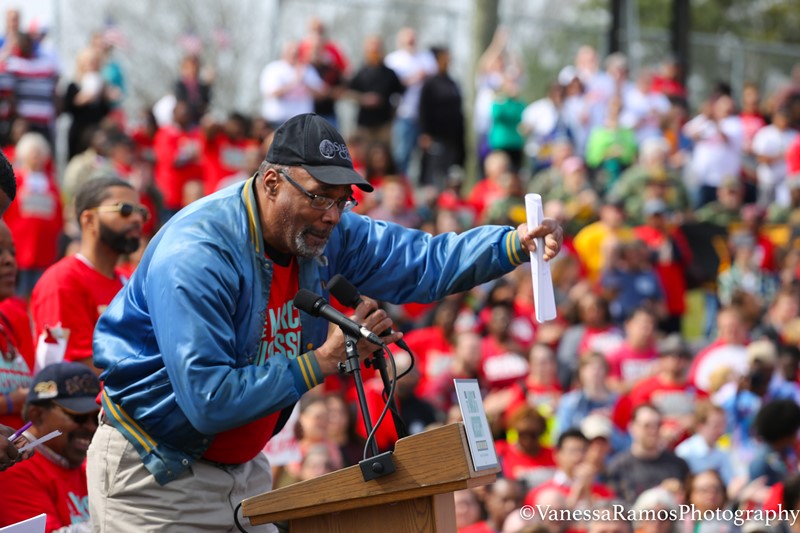This last Saturday Sierra Club President Aaron Mair joined NAACP President Cornell Brooks, US Senator Bernie Sanders, actor Danny Glover, United Auto Workers President Dennis Williams, Black Lives Matter activists, church groups, the American Civil Liberties Union, and more than 5,000 of their closest friends in the largest civil rights march in Mississippi since the height of the civil rights movement.
The march supported workers at Nissan’s Canton, Mississippi factory in their push for recognition of their union. Few people remember that Dr. Martin Luther King, Jr. was killed supporting Memphis sanitation workers in their demand that their humanity be recognized through recognition of their union. Saturday’s march took us another step towards Dr. King’s still unfulfilled vision that economic justice is inextricably tied to racial and environmental justice.
Nissan makes the Leaf, an excellent electric vehicle, and in some ways they have been global leaders in the move towards cleaner vehicles. But as Sierra Club President Aaron Mair pointed out on Saturday, we can’t transition to a clean future on the backs of working people.
"We cannot save this planet on the back of a degraded labor." -Sierra Club president @HighSierraAaron #MarchOn pic.twitter.com/r9sGobw0AE
— Sierra Club (@SierraClub) March 4, 2017
Unfortunately, when it comes to their workers in Mississippi, 80 percent of whom are African-American, Nissan has been a poster child how not to do a “just transition” to a clean economy.
Forty-two of Nissan’s 45 manufacturing facilities around the world are unionized. The only three that are not are in the United States, two in Tennessee (one of which makes batteries for the Leaf) and this one in Mississippi. The workers and their allies argue that it is not a coincidence that these are both former slave states and so-called “right to work” states. Scholars have made a strong case that the anti-union “right to work” movement was not only born out of the legacy of slavery, it is the present day incarnation of the values underlying the slave system.
“Those on the front lines of environmental degradation and industrial pollution are on the front lines of labor exploitation,” said Vanessa Ramos, a Sierra Club associate press secretary who attended Saturday’s rally. “Environmental protections, and an equal seat at the negotiating table go hand in hand in creating a safe environment and a just workplace.”
.@HighSierraAaron: When our democracy is under attack, what do we do?
— Democracy Initiative (@Unite4Democracy) March 4, 2017
Crowd: STAND UP, FIGHT BACK!#dobetternissan #MarchOnMississippi
Many workers in Canton make less than $15 an hour. These low wages deepen the grip of the ancient race and class-based caste system that drives massive profits to a tiny global elite, extracted from the poorly compensated labor of the global majority who struggle to survive. Workers at the Nissan plant in Canton say they are in many cases forced to work for years as temporary employees and are denied vacation benefits.
“It’s empowering to see so many leaders, both here and abroad, offering their support to us as we speak out against Nissan’s attacks on our civil rights at the plant,” said Nissan employee Morris Mock, who works on the paint line at the Canton plant. “I have two daughters, and I want them to grow up in a community where they will have a real shot at a good future and a decent living. That’s why I’m going to keep fighting for good jobs at Nissan’s plant, no matter what it takes.”
Without a union, workers are often forced to work in unsafe conditions. Since 2008, the Occupational Safety and Health Administration (Osha) has cited Nissan’s Canton facility six times. In 2015, the National Labor Relations Board charged that the company and its temporary employee agency provider violated workers’ rights, with one manager threatening to close the plant if it went union. Workers say the company routinely imposes one-on-one meetings, where they are questioned about their views on unionization and have their work histories reviewed. They those who support the union are routinely denied promotion or fired, workers say.
Out here in Canton, MS marching in solidarity with Nissan Workers. @HighSierraAaron @SierraClub #union #labor #humanrights #ej pic.twitter.com/Rwjb3YOf85
— Vanessa Ramos (@vamosvane) March 4, 2017
Sierra Club Mississippi Director Louie Miller attended the rally, too. “Mississippians of every stripe turned out in droves to show their support for Nissan workers and the star-studded line up of speakers who carried the message,” he said. “What I witnessed was a yearning of citizens expressing their solidarity for something greater, for a chance to channel their energies, beliefs and values for the American Dream in the age of Trump.”
The Sierra Club involved in this economic and racial justice issue because we know that in order to transform the fossil fuel-based energy economy to 100 percent clean energy justice for all, we must fundamentally break with the market-driven and exploitive relationships and dynamics of the past and embrace policy solutions and institutional relationships predicated on environmental, economic, and racial justice.
“The clean energy economy must be just and must include everyone,” said Ramos. “Workers are at the forefront for our clean energy economy and they have a right to sustain themselves and their families while they improve the local economy in Mississippi and throughout the world.”
